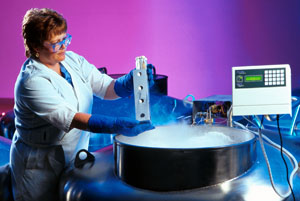5585 Guilford Road • Madison, WI 53711-5801 • 608-273-8080 • Fax 608-273-2021
www.agronomy.org
Twitter | Facebook
NEWS RELEASE
Contact: Hanna Jeske, Associate Director of Marketing and Brand Strategy, 608-268-3972, hjeske@sciencesocieties.org
Seed science might save the world
Media Invitation
Contact: Susan V. Fisk, 608-273-8091, sfisk@sciencesocieties.org. Please RSVP by October 20, 2014
Sept. 30, 2014—On Monday, Nov. 3, 2014, speakers at the American Society of Agronomy, Crop Science Society of America, and the Soil Science Society of America International Annual Meetings will describe the latest research interface of seed physiology and germplasm conservation. Topics of the “Seed Physiology and Germplasm Conservation” symposium include seed longevity, deterioration, and dormancy as they relate to germplasm conservation issues. The presentations are part of the joint societies’ annual meeting, Nov. 3-5 in Long Beach, California. The theme of this year’s conference is Grand Challenges, Great Solutions. Members of the media receive complimentary registration to the joint meetings.

Technician Jolene Hansen examines seeds preserved in a vat of liquid nitrogen that can hold 5,000 containers of up to 2,000 seeds. The longevity of cryopreserved seeds is projected to be hundreds of years, but scientists periodically remove them to assess their viability and vigor. Photo credit: USDA-ARS
“Seeds have a remarkable ability to stay alive…sometimes for 100’s of years,” says presenter Christina Walters, a seed scientist with USDA-ARS. Her talk is titled How Seed Science Might Save the World. “Seeds can tolerate extreme stresses. They have a secret of how they can survive complete drying, cold, heat and other stresses. They accumulate protection. Understanding how seeds adapt and survive is important for agronomic systems.”
Walters’ presentation will provide an overview of ongoing seed conservation initiatives that are contributing new perspectives and knowledge about seeds. She will also review arising questions about seed biology as the global community gains experience with a broader range of species and environmental conditions.
“Seeds are one of the few biological organisms that tolerate extreme stresses,” says Walters. “They don’t show signs of life as we see it, [move, reproduce, etc.], yet they are alive. Seeds have an internal clock that dictates their dormancy. How does time relate to these seeds? If we can unlock the secrets to how they tolerate this stress, we can stop the clock.”
For more information about the Grand Challenges, Great Solutions meeting sponsored by American Society of Agronomy, Crop Science Society of America, and the Soil Science Society of America, visit acsmeetings.org. Media are invited to attend the conference. Pre-registration by Oct. 20, 2014, is required. Visit https://www.acsmeetings.org/newsroom for registration information.
To speak with Dr. Walters, contact Susan V. Fisk, 608-273-8091, sfisk@sciencesocieties.org to arrange an interview.